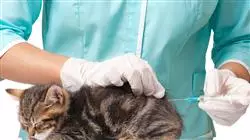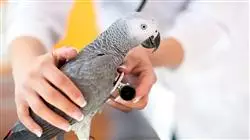University certificate
The world's largest faculty of veterinary medicine”
Description
Become a professional in one of the most in-demand fields of the moment: train in Pain Management in Small Animals with this comprehensive postgraduate diploma”

The goal of this comprehensive postgraduate diploma is to help studnets know all the aspects of Pain Management in Small Animals, which we now present to you. With a wide methodological development, throughout this training you will be able to learn each and every one of the fundamental points in this area of work.
However, the success of an anesthetic procedure goes far beyond the administration of the appropriate drugs. It is essential to master pre-anesthetic assessment, induction, maintenance and education in order to achieve success in the process and a return to normality without sequelae. Fluid therapy and even transfusion must also be taken into account and for that reason are one of the focuses of our comprehensive postgraduate diploma in Pain Management in Small Animals.
The anesthesiologist must also take care of pain management. A basic vital sign that, if not adequately controlled, can be one of the main causes of delayed discharge and perioperative complications. Acquiring competence in this part of care is another of our major objectives.
A training which will allow you to advance in an exponential way in your knowledge and skills in this field of work.
Achieve comprehensive and relevant training in Pain Management in Small Animals with this highly effective postgraduate diploma and open new pathways for your professional progress"
This postgraduate diploma in Pain Management in Small Animals offers you the advantages of a high-level scientific, teaching, and technological course. These are some of its most notable features:
- Latest technology in online teaching software
- Highly visual teaching system, supported by graphic and schematic contents that are easy to assimilate and understand
- Practical cases presented by practising experts
- State-of-the-art interactive video systems
- Teaching supported by telepractice
- Continuous updating and recycling systems
- Self-regulating learning: full compatibility with other occupations
- Practical exercises for self-evaluation and learning verification
- Support groups and educational synergies: questions to the expert, debate and knowledge forums
- Communication with the teacher and individual reflection work
- Availability of content from any fixed or portable device with internet connection
- Supplementary documentation databases are permanently available, even after the course
A postgraduate diploma that will enable you to address pain in veterinary medicine with the competence of a high-level professional”
Our teaching staff is made up of professionals from different fields related to this specialty. In this way, we ensure that we provide you with the training update we are aiming for. A multidisciplinary team of professionals trained and experienced in different environments, who will cover the theoretical knowledge in an efficient way, but, above all, will put the practical knowledge derived from their own experience at the service of the course: one of the differential qualities of this course.
This mastery of the subject is complemented by the effectiveness of the methodological design of this postgraduate diploma in Pain Management in Small Animals. Developed by a multidisciplinary team of e-learning experts, it integrates the latest advances in educational technology. This way, you will be able to study with a range of comfortable and versatile multimedia tools that will give you the operability you need in your training.
The design of this program is based on Problem-Based Learning: an approach that conceives learning as a highly practical process. To achieve this remotely, we will use telepractice: with the help of an innovative interactive video system, and learning from an expert, you will be able to acquire the knowledge as if you were actually dealing with the scenario you are learning about. A concept that will allow you to integrate and fix learning in a more realistic and permanent way.
A postgraduate diploma that will enable you to work in all fields of Veterinary Anesthesiology with the competence of a high-level professional"

You will have the experience of expert professionals who will contribute their experience in the field to the program, making this training a unique opportunity for professional growth"
Objectives
Our objective is to train highly qualified professionals for work experience. An objective that is complemented, moreover, in a global manner, by promoting human development that lays the foundations for a better society. This objective is focused on helping medical professionals reach a much higher level of expertise and control. A goal that, in just six months, you will be able to achieve with a highly intensive and precise course.

Acquire the most advanced skills in Pain Management in Small Animals in just a few months, with a training course specifically created to be compatible with other commitments”
General Objectives
- Learn and understand the physiology of nociceptive and acute and chronic pain
- Acquire a logical understanding of the physiological implications of untreated pain
- In-depth knowledge of the different analgesics and their indications
- Know how to assess both acute and chronic pain
- Understand the basics of locoregional anesthesia and analgesia
- Understand the main differences and indications of different drugs
- Understand the different blockages t be performed and the areas affected by them
- Understand the monitoring of the anesthetized patient, from the most basic to the most complicated such as nociception and hypnosis monitoring
- Understand the limitations and the most appropriate monitoring in each patient and in each specific case
Specific Objectives
Module 1. Analgesia
- Understand the different nociceptive pathways and the phenomena of central and peripheral sensitization
- Understand the action of each family of analgesics and their use in both acute and chronic pain
- Know the importance and the different methods of acute and chronic pain assessment
Module 2. Locoregional Anesthesia/Analgesia
- Understand the basics of locoregional anesthesia and analgesia with the different technical methods used
- Know the main complications associated with locoregional techniques and their treatment
- Understand basic pharmacology of local anesthetics and their adjuvants
- Understand the different blockages to be performed on the head, trunk and limbs
- Inclusion of locoregional techniques explained in specific clinical cases, within multimodal analgesia protocols
Module 3. Monitoring
- Understand in detail how to make the most of basic patient monitoring based on examination, observation and palpation
- Understand the most important parameters to monitor from a cardiovascular, ventilatory and neurological point of view
- Understand and assess the different methods of monitoring the patient's blood volume

A path to achieve training and professional growth that will propel you towards a greater level of competitiveness in the employment market"
Postgraduate Diploma in Pain Management in Small Animals
The advancement of veterinary sciences has migrated to the point of being almost analogous to the medicinal sciences that attend to human health. Nowadays, companion animals enjoy privileges that once could only be considered the exclusivity of people with whom they shared a filial bond, which is why we are increasingly seeking to optimize treatment methods to the maximum so that the animal patient obtains guarantees comparable to the human condition. Solving this turning point, TECH Global University presents its course of Postgraduate Diploma in Pain Management in Small Animals: a complete program that is enhanced with the advantages of online education to provide the student with a set of solid skills in terms of anesthetic and pharmacological management before, during and after a more than necessary intervention in extreme circumstances where the pain of the canine or feline patient is mitigated, thus obeying the professional ethics and the full satisfaction of both the owner and the animal itself.
Learn how to relieve discomfort in companion animals
It has long been well known that animals can feel on the same scale as humans. A National Geographic article reports that mammals share the same nervous system and neurochemical substances derived from it, therefore, the experience of perceiving pain is equated to the same level in all those belonging to that classification. There have been cases, for example, of dogs that have a leg amputated and experience the same sensation of the so-called "phantom limb" that occurs in people. The training we provide is the perfect tool to delve into the parameters that trigger different types of pain, as well as the scientific and medical guidelines that you should undertake to reduce the stress involved in such a condition mainly in dogs and cats that are usually the pets par excellence. With a thorough syllabus that includes from the classification of analgesics and anti-inflammatory drugs to the monitoring of vital signs, you will become a skilled professional who contributes to the welfare of other beings, which represents a personal achievement that will fill you with fulfillment.







